In July 2023, Google will sunset Universal Analytics (UA), forcing users to switch to Google Analytics 4 (GA4) or another provider.
This hasn't proved a popular decision. Not only is GA4 a radical departure for existing users, it's very difficult to migrate existing UA data to GA4.
To further complicate matters, Google Analytics is under fire from European regulators due to its imperfect GDPR compliance, further driving users towards alternatives.
In this guide we'll cover:
- The differences between UA and GA4
- Why existing users want to switch
- The best GA4 alternatives for different use cases
In simple terms, the core difference comes from how UA and GA4 track activity:
Universal Analytics is a session-based analytics platform. It's designed for a time when desktop websites were the norm, and people didn't think much about what cookies were. It's good at tracking things like the number of sessions on a website, how many pageviews they generated, and where they came from.
Google Analytics 4 uses an event-based tracking system. It's designed for tracking what people actually do, such as when they click a button, complete an action, or when they fail to do so. It can still track things like pageviews and website referrers, but its event-based model is more flexible and powerful.
If event-based tracking is so great, why do people hate GA4 so much?
People tend to fall into one or more of the following camps:
Users who miss pre-defined reports: GA4 lacks many of the pre-defined reports users relied on to do their jobs. Stuff is just harder to find in GA4, unnecessarily so. Some speculate popular reports will make a return one day, but there's no guarantee they will.
Users who lack data science support: Universal Analytics is popular among small business users and marketing teams, but GA4 caters to large corporate users and app developers. GA4's greater emphasis on exporting data to Data Studio or BigQuery for analysis is hard for users who lack data science and analytics support.
App developers who need more features: While GA4 courts app developers, it still falls short of the numerous alternatives that lured customers away from Universal Analytics in the first place. To many, GA4 is too little, too late.
Users concerned about privacy compliance: The collapse of the EU-US privacy shield makes using Google Analytics in Europe problematic. GA4 attempts to improve privacy, but not enough according to many data protection agencies. GA4 is also incompatible with US health legislation, so can't be used in healthcare settings.
The following GA4 alternatives all solve one or more of these issues. Some provide a similar experience to UA, while others focus on unimpeachable privacy, or greater insights. In each case, we've highlighted the strengths of each tool and the ideal use cases.
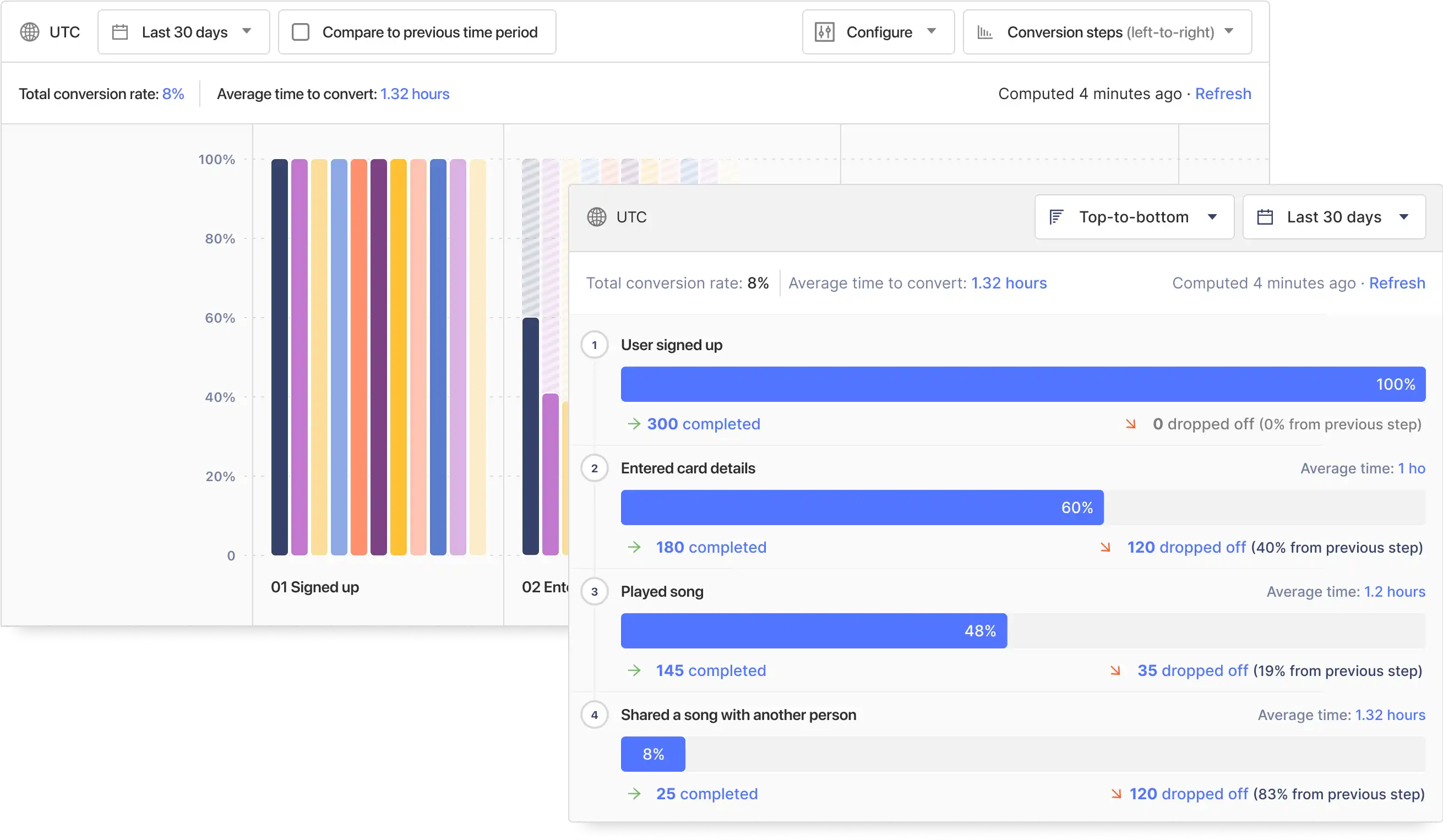
- Best for: Mobile and desktop apps
- Tracking method: Event-based
- GDPR compliance: ✔ (via self-hosting or EU Cloud)
- GA data import: ✖
PostHog is an all-in-one Product OS that includes product analytics, session recording and A/B testing – pretty much everything you need to track user behavior in an app or website, basically. Like GA4, PostHog is an event-based platform. It's priced on per event used, though it offers a generous 1 million events for free each month, so most smaller users can use it for free.
As an open source product, you can see exactly what the team is working on via the PostHog's public roadmap. Small projects can self-host PostHog to keep complete control of their data, while PostHog Cloud (with US and EU hosting options) is available for those who want a managed SaaS experience.
| Google Analytics 4 | PostHog | |
| Website analytics | ✔ | ✔ |
| Funnels | ✔ | ✔ |
| User Paths | ✔ | ✔ |
| Retention | ✔ | ✔ |
| Revenue tracking | ✔ | ✔ |
| User profiles | ✔ | ✔ |
| Cohort analysis | ✔ | ✔ |
| A/B testing | ✖ | ✔ |
| Session recording | ✖ | ✔ |
| Feature flags | ✖ | ✔ |
| Self-hosting | ✖ | ✔ |
PostHog is an all-in-one platform for tracking user behavior in apps and websites. While it's a powerful tool for marketing in the right hands, it's best deployed by product and engineering teams seeking deep insights into how users use their product. Integrated session recording, A/B testing and feature flag products mean it can also replace several other products in a company's tech stack.
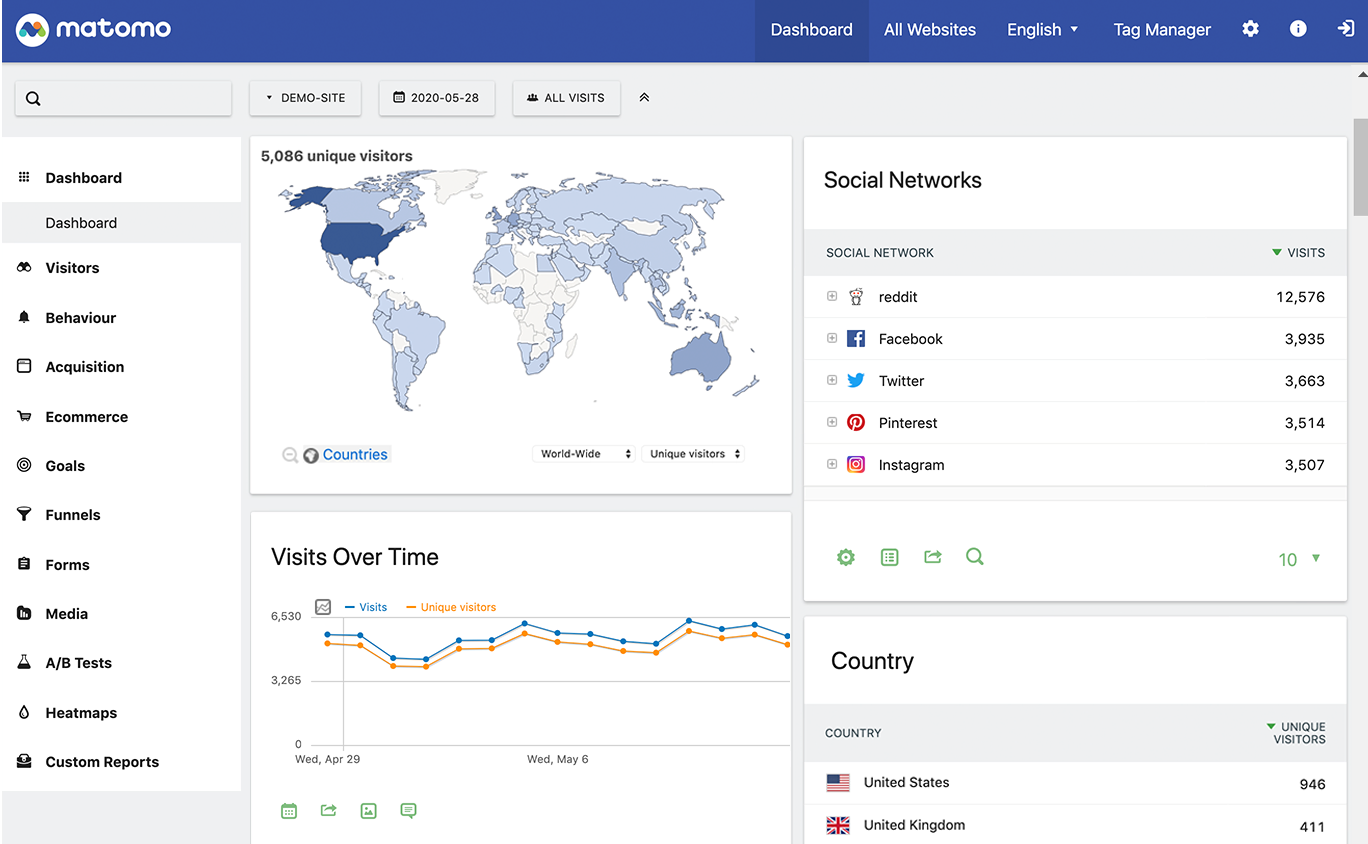
- Best for: Content, marketing and e-commerce websites
- Tracking method: Session-based
- GDPR compliance: ✔
- GA data import: ✔
Matomo is one the most popular Google Analytics alternatives around. Like UA, it's based on a session-based tracking model, and it even allows new users to import data from an existing Google Analytics account.
It also shares some of the weaknesses of Google Analytics. While Matomo has added more advanced analytics features, it's better suited to traditional website analytics than tracking desktop and mobile apps. Like PostHog, it's open source, so can be self-hosted if you prefer.
| Google Analytics 4 | Matomo | |
| Website analytics | ✔ | ✔ |
| Funnels | ✔ | ✔ |
| User Paths | ✔ | ✔ |
| Retention | ✔ | ✔ |
| Revenue tracking | ✔ | ✔ |
| User profiles | ✔ | ✔ |
| Cohort analysis | ✔ | ✔ |
| A/B testing | ✖ | ✔ |
| Session recording | ✖ | ✔ |
| Feature flags | ✖ | ✖ |
| Self-hosting | ✖ | ✔ |
Matomo has feature parity with GA4 and even goes further thanks to its A/B testing and session recording features. Universal Analytics users will feel right at home using Matomo, too, making it a great choice for content and marketing teams.
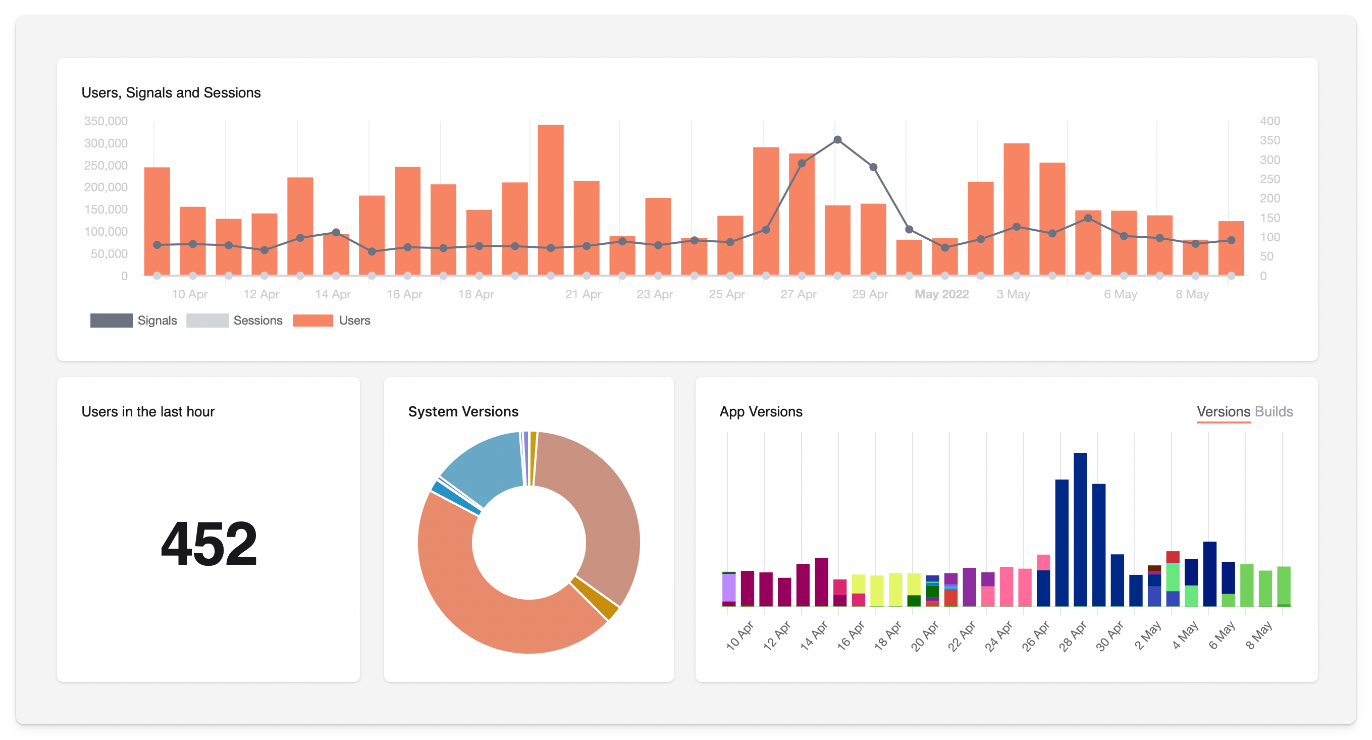
- Best for: Mobile apps
- Tracking method: Event-based
- GDPR compliance: ✔
- GA data import: ✖
While it can be used on websites, TelemetryDeck is primarily a privacy-minded analytics tool for mobile apps. As such, it uses an event-based tracking model – TelemetryDeck calls them signals. It has first-party SDKs for Swift (iOS, macOS etc. apps), Kotlin (Android and Java apps), and Javascript (node and web apps).
TelemetryDeck makes it easy for app developers to track things like active users, OS version, app version, and basic user metadata like user location. It also supports basic retention and conversion funnel insights. TelemetryDeck only collects basic user metadata, so you don't need tracking consent banners.
| Google Analytics 4 | TelemetryDeck | |
| Website analytics | ✔ | ✔ |
| Funnels | ✔ | ✔ |
| User Paths | ✔ | ✖ |
| Retention | ✔ | ✔ |
| Revenue tracking | ✔ | ✖ |
| User profiles | ✔ | ✖ |
| Cohort analysis | ✔ | ✖ |
| A/B testing | ✖ | ✖ |
| Session recording | ✖ | ✖ |
| Feature flags | ✖ | ✖ |
| Self-hosting | ✖ | ✖ |
TelemetryDECK is a good option for those who want basic app analytics, but it falls someway short of feature parity with GA4.
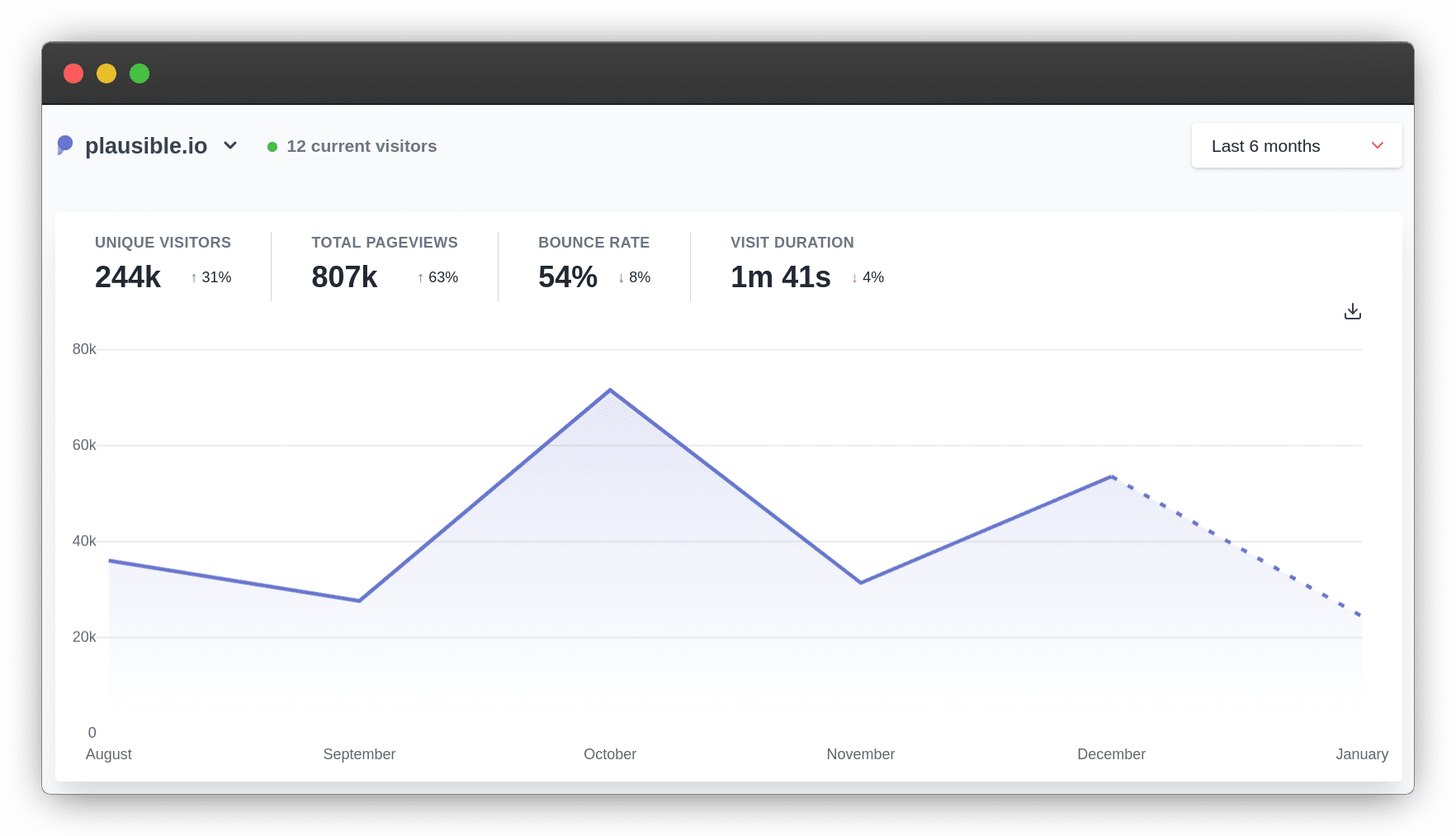
- Best for: Content and marketing websites
- Tracking method: Session-based
- GDPR compliance: ✔
- GA data import: ✔
Plausible is a leader in the trend of lightweight, privacy-orientated analytics tools. It's easy to use and doesn't collect any personally identifiable information. This makes it ideal for complying with GDPR, but this comes at the cost of functionality.
Plausible, and others like it, can only track very basic website metrics like pageviews, session duration, and referrer information. This makes it useless for apps, and significantly less powerful than Google Analytics and other alternatives in this list.
| Google Analytics 4 | Plausible | |
| Website analytics | ✔ | ✔ |
| Funnels | ✔ | ✖ |
| User Paths | ✔ | ✖ |
| Retention | ✔ | ✖ |
| Revenue tracking | ✔ | ✖ |
| User profiles | ✔ | ✖ |
| Cohort analysis | ✔ | ✖ |
| A/B testing | ✖ | ✖ |
| Session recording | ✖ | ✖ |
| Feature flags | ✖ | ✖ |
| Self-hosting | ✖ | ✔ |
While it lacks many of the advanced features of GA4, Plausible is a good option for content and marketing teams who just want easy to use, basic website analytics.
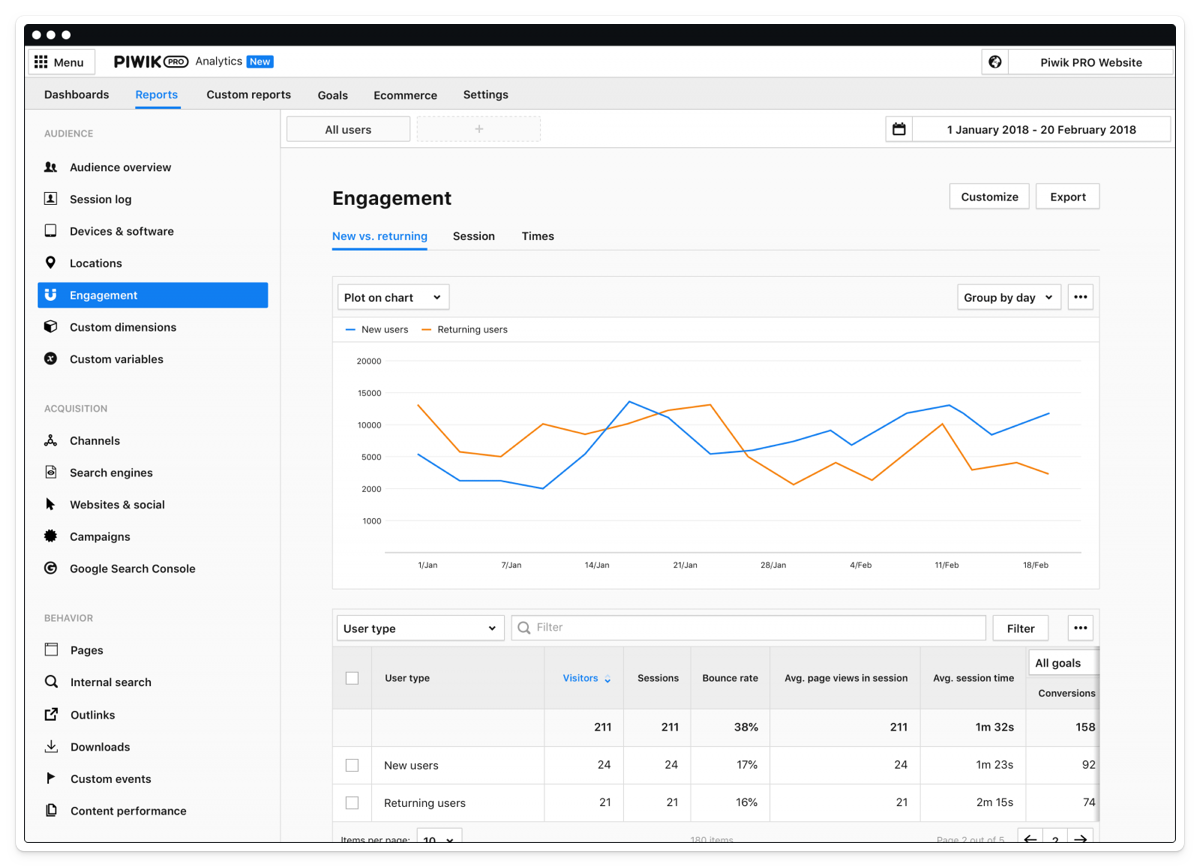
- Best for: Content, marketing and e-commerce websites
- Tracking method: Session-based
- GDPR compliance: ✔
- GA data import: ✖
Piwik PRO is a commercial spinoff of Matomo – Matomo used be called Piwik. As such, there are some similarities between the two, such as session-based tracking and superficial UX similarities.
Piwik PRO's main differentiators are enterprise level support and the integration of a customer data platform (CDP). Like Matomo, it also puts an emphasis on privacy compliance by integrating a consent manager.
| Google Analytics 4 | Piwik PRO | |
| Website analytics | ✔ | ✔ |
| Funnels | ✔ | ✔ |
| User Paths | ✔ | ✔ |
| Retention | ✔ | ✖ |
| Revenue tracking | ✔ | ✔ |
| User profiles | ✔ | ✔ |
| Cohort analysis | ✔ | ✔ |
| A/B testing | ✖ | ✖ |
| Session recording | ✖ | ✖ |
| Feature flags | ✖ | ✖ |
| Self-hosting | ✖ | ✔ |
Unsurprisingly, Piwik PRO's roots in Matomo make it a popular choice for users who are familiar with Universal Analytics. It's less feature-rich than Matomo in some respects, but may be a better choice for larger organisations who require more support and scale.
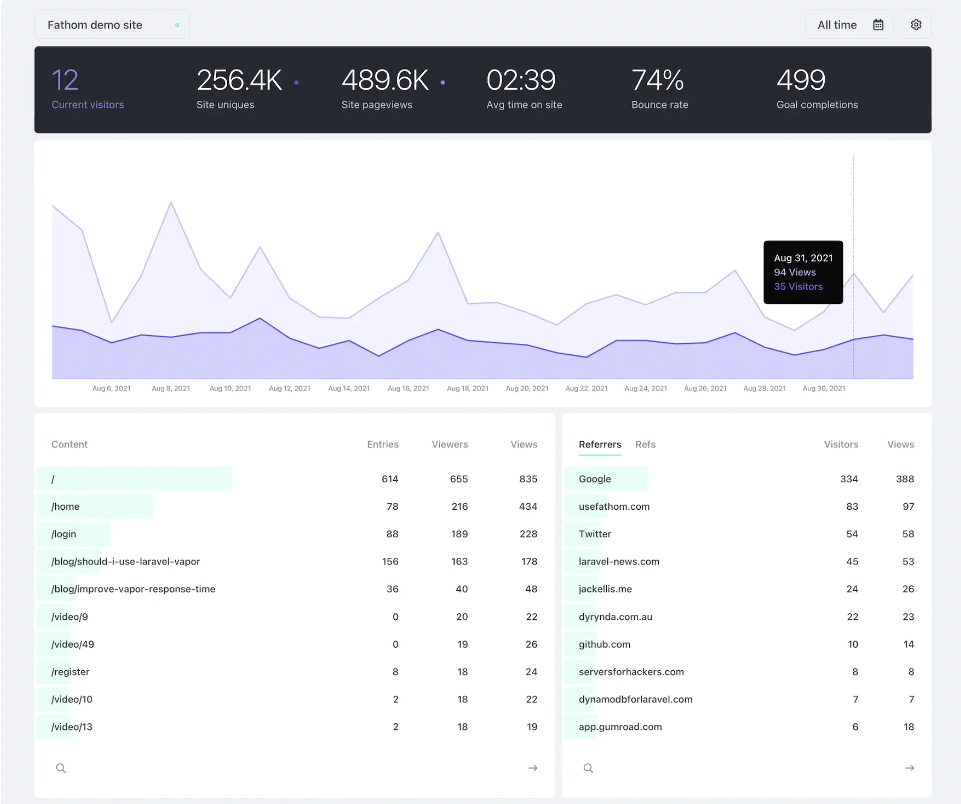
- Best for: Content and marketing websites
- Tracking method: Session-based
- GDPR compliance: ✔
- GA data import: ✖
Fathom is another leading privacy-focused analytics tool that's similar in scope to Plausible. It's ideal for small and medium-size marketing websites, but it lacks the deeper features typical Google Analytics users will demand. It doesn't currently support GA data import, though it is in development.
| Google Analytics 4 | Fathom | |
| Website analytics | ✔ | ✔ |
| Funnels | ✔ | ✖ |
| User Paths | ✔ | ✖ |
| Retention | ✔ | ✖ |
| Revenue tracking | ✔ | ✖ |
| User profiles | ✔ | ✖ |
| Cohort analysis | ✔ | ✖ |
| A/B testing | ✖ | ✖ |
| Session recording | ✖ | ✖ |
| Feature flags | ✖ | ✖ |
| Self-hosting | ✖ | ✖ |
There isn't much to choose between Fathom and the other privacy-first option on this list, Plausible. Again, if you want lightweight website analytics without the feature bloat of Google, you can't go wrong with Fathom.

